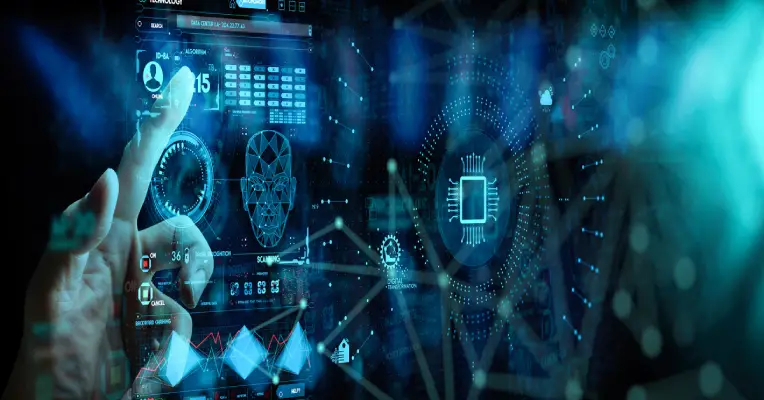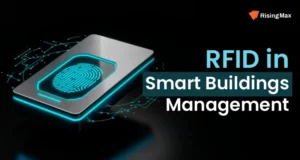We help you design a gesture recognition app powered by computer vision, image processing, and advanced mathematical algorithms to understand, interpret, and respond to various hand gestures, facial expressions, and body motions. Gesture recognition apps and software have gained a huge momentum and are employed to control devices such as computers, smartphones, and IoT-connected systems. Connect with our expert to discuss your gesture recognition app idea in detail.

Gesture Recognition Market Stats & Future Trends
- The Global Gesture Recognition Market size is expected to cross the USD 58.81 billion mark, growing at a CAGR of 19.1 percent from 2023 to 2029. (Maximise Market Research)
- The gesture recognition market size is projected to expand at a compound annual growth rate (CAGR) of 18.8 percent from 2023 to 2030. (Grand View Research)
- The global gesture recognition market is projected to grow from USD 19.37 billion in 2023 to USD 115.70 billion by 2030, at a CAGR of 29.1 percent. (Fortune Business Insights)
Gesture Recognition App Development: Empowering The Touchless World
Gesture recognition apps or software are based on the natural and intuitive way people interact with one another. Apps powered with highly advanced algorithms interpret human gestures and respond without direct physical contact with the system, thus empowering the touchless world.
Gesture recognition apps allow deaf and hearing impaired users to operate devices like smartphones and computers. Employing touchless technologies like computer vision and image processing, the next-gen applications play a major role in redefining human-computer or human-technology interactions. The ease of use, enhanced experience, and intuitive controls give gesture-based apps an edge over traditional mobile apps and software solutions.
As a top-tier gesture recognition app development company, we have successfully designed and developed multiple gesture apps for its worldwide clientele. Connect with our experts and discuss your gesture-based app idea.
Use Cases of Gesture Recognition App & Software
Automotive
Gesture recognition technology is widely used in automotive vehicle to control various functions such as radio, AC, sunroof and navigation system,
Healthcare
In healthcare, the gesture recognition apps and software are widely used to provide easy access to healthcare services for patients with physical disabilities.
Virtual Reality
The gesture recognition software are employed to provide easy control to uses for accessing virtual environment and manipulate object in the virtual world.
Entertainment
A gesture recognition app allows users to skip, swipe and tap on the content while watching on mobile, computer, and tablet.
Gaming
Gesture recognition technology makes it easy for players to control character movement and objects in the video games.
Benefits of Gesture Recognition Applications
Gesture recognition apps provide users with a natural, familiar, and intuitive hand gesture method to interact with a computer system. The integrated advanced algorithms and next-gen technologies empower gesture-based apps to provide multiple benefits that traditional mobile apps fail to offer.
Make Technology More Accessible
Where traditional technology interfaces are not easily accessible to persons with disabilities, gesture-based apps assist in overcoming these technology barriers. Investing in gesture-based apps allows businesses to provide easy navigation to users with mobility challenges.
Streamline Interaction
The complex interface of multiple electronic devices hinders a person’s ability to communicate with them effectively. However, a gesture-based system assists in streamlining communication and enhancing user engagement. Users can navigate multiple electronic devices with simple hand gesture such as wave, swipe, or pinch to trigger actions.
Remove Unnecessary Buttons
Next-gen devices require fewer buttons and unnecessary components. Gesture-based apps eliminate the need for unnecessary components and allow users to access the system using hand gestures. Users can accomplish tasks faster and more accurately with fewer buttons and streamlined conversations. Small-screen gadgets like smartphones can take advantage of gesture recognition technology to remove unnecessary buttons and create appealing phone designs.
Intuitive Controls
Buttons in smartphones or devices are places to complete a specific task and derive a particular call-to-action. While pressing a button can get a particular job done, allocating a specific button for each task won’t make any sense. This is where gestures have an edge, as they are more natural and simplify users’ experience.
Take for instance, the swiping feature in the Tinder app, where users can swipe left or right to express their interest in users. The swipe gesture triggers the like or dislike button. With time, many ecommerce platforms have integrated the same feature to make product recommendations.
Create an Engaging App
Digital era users won’t settle for a useful app; it needs to be attractive and engaging as well. Integrating gesture recognition features assists in creating an engaging application that offers an unmatched user experience. With fewer buttons on the screen, users can easily enjoy direct interaction with the content without any distractions. Further, the mobile application’s user interface becomes more pleasing, engaging, and minimalistic.
Touchless Technologies Igniting the Gesture Recognition Application
Camera
Many gesture-based applications take advantage of cameras to receive input and provide necessary output. Built-in smartphone cameras coupled with computer vision technology to analyze, interpret, and respond to gestures.
Some smartphones out there take input from the built-in camera to click a picture, open a flashlight, or perform a particular assigned feature.
Further, in the automotive sector, the camera in the front dashboard captures the hand gesture to open the sunroof or start FM/AC.
Infrared (IR) sensors
Infrared rays are invisible to human eyes, and a perfect touchless technology to scan the nearby environment and detect gestures. A generative recognition app leverages active infrared sensors to recognize the light reflected from the object and provide the necessary output. Infrared sensors are relatively low-cost touchless technologies, making them a good match for industrial and automotive applications.
Radar
When it comes to the most accurate and rewarding touchless gesture technologies out there, Radar holds the topmost position. Radar’s ability to detect even the tiniest movement and gesture gives it an edge over others. The limitations of camera and infrared sensors include dirt, weather conditions, rain, or heavy snow, which makes radar a reliable, touchless technology partner.
Computer Vision
The images or gestures captured with the camera are analyzed and interpreted with the help of computer vision technology. Different gestures, such as hand gestures and head nods, are processed in real time to complete the assigned task.
Intriguing Feature of Gesture Recognition Application
While designing a gesture recognition application, there are multiple features you can include to provide an enhanced and seamless navigation experience to users. Intriguing feature of a gesture recognition app includes the following;
Gesture Detection
Take advantage of this gesture detection app feature to accurately analyze and detect predefined gestures in real time.
Gesture Customization
This feature allows users to create, add, and modify existing gestures as per convenience.
Multi-Platform Support
This feature of the gesture recognition app allows easy integration with multiple devices and operating systems.
Apps Integration
The easily available API/SDK makes it easy for developers to integrate gesture recognition apps with the existing application.
Voice Integration
Users can use this feature to provide voice commands and gesture recognition and enjoy a more comprehensive control experience.
Configurable Settings
Leveraging this feature, users can change the configuration settings of gesture recognition applications, such as sensitivity and gesture response time.
Feedback
With this feature, users can provide real-time feedback related to gesture recognition, visual response, and app sensitivity.
Gesture Analytics
This feature allows users to analyze their interaction with the application and track frequently used gestures.
Authentication
This feature assists in limiting unauthorized access with in-built authentication features such as biometrics, password, or gesture authentication.
Access
With this feature, users with a disability can enjoy personalized access and easily navigate the application without hassle.
Training Mode
This feature of the gesture recognition application allows users to learn the gesture and provide feedback on new gestures.
Gaming Integration
With this feature, the gesture recognition app can be integrated with different gaming platforms to provide a seamless gameplay experience.
Offline Mode
This feature allows users to access a gesture recognition app offline without a continuous internet connection.
How Much Does It Cost To Build A Gesture Recognition App?
The development cost of a gesture recognition app varies between $60,000 to $80,000. Further, the app development cost might vary based on the cost-driving factors mentioned below. App development companies evaluate these factors and share an estimated development cost.
Prominent cost-driving factors of gesture recognition apps include;
- Gesture app complexity
- Integrated features
- Development scope
- In-built security features
- Required tech stack
- Location of gesture app development company
- Team Expertise and Strength
- Additional requirements
Looking for a customized gesture recognition app development cost?
We at RisingMax Inc. provide customized project development costs for all our clients’ projects. Our development team carefully analyzes app requirements and cost-driving factors before sharing a development quote. Connect with our experts and share your requirements; we will share a customized gesture recognition app development quote ASAP.
Why Choose Us?
Since our inception, we have had the privilege of working with clients in different business verticals and developing next-gen business solutions for them. Leveraging our hands-on development expertise and multi-domain experience, we design cutting-edge business solutions that meet client’s requirements.
Here’s why we are the right business partner;
- Unmatched development expertise
- Experienced and certified professionals
- Tailored business solutions
- Flexible hiring model
- Affordable development services
The popularity of gesture recognition apps is growing at an exponential rate. Now is the right time to launch a gesture recognition application and explore new business opportunities.
So, why wait?
Schedule a free consultation call with our experts and share your project development requirements today!














